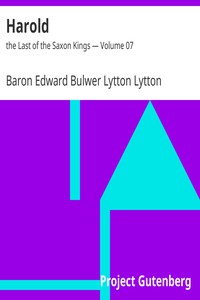Harold : the Last of the Saxon Kings — Complete by Lytton (good books for 8th graders .TXT) 📗

- Author: Lytton
Book online «Harold : the Last of the Saxon Kings — Complete by Lytton (good books for 8th graders .TXT) 📗». Author Lytton
While gnashing his teeth with a wrath the more deadly because he saw not yet his way to retribution,—Judith, pursuing the separate thread of her own cogitations, said:
“And if my sister’s lord, the Count of the Normans, had, as rightly he ought to have, succeeded his cousin the Monk-king, then I should have a sister on the throne, and thou in her husband a brother more tender than Harold. One who supports his barons with sword and mail, and gives the villeins rebelling against them but the brand and the cord.”
“Ho!” cried Tostig, stopping suddenly in his disordered strides, “kiss me, wife, for those words! They have helped thee to power, and lit me to revenge. If thou wouldst send love to thy sister, take graphium and parchment, and write fast as a scribe. Ere the sun is an hour older, I am on my road to Count William.”
CHAPTER V.
The Duke of the Normans was in the forest, or park land, of Rouvray, and his Quens and his knights stood around him, expecting some new proof of his strength and his skill with the bow. For the Duke was trying some arrows, a weapon he was ever employed in seeking to improve; sometimes shortening, sometimes lengthening, the shaft; and suiting the wing of the feather, and the weight of the point, to the nicest refinement in the law of mechanics. Gay and debonnair, in the brisk fresh air of the frosty winter, the great Count jested and laughed as the squires fastened a live bird by the string to a stake in the distant sward; and “Pardex,” said Duke William, “Conan of Bretagne, and Philip of France, leave us now so unkindly in peace, that I trow we shall never again have larger butt for our arrows than the breast of yon poor plumed trembler.”
As the Duke spoke and laughed, all the sere boughs behind him rattled and cranched, and a horse at full speed came rushing over the hard rime of the sward. The Duke’s smile vanished in the frown of his pride. “Bold rider and graceless,” quoth he, “who thus comes in the presence of counts and princes?”
Right up to Duke William spurred the rider, and then leaped from his steed; vest and mantle, yet more rich than the Duke’s, all tattered and soiled. No knee bent the rider, no cap did he doff; but seizing the startled Norman with the gripe of a hand as strong as his own, he led him aside from the courtiers, and said:
“Thou knowest me, William? though not thus alone should I come to thy court, if I did not bring thee a crown.”
“Welcome, brave Tostig!” said the Duke, marvelling. “What meanest thou? nought but good, by thy words and thy smile.”
“Edward sleeps with the dead!—and Harold is King of all England!”
“King!—England!—King!” faltered William, stammering in his agitation. “Edward dead!—Saints rest him! England then is mine! King!—I am the King! Harold hath sworn it; my Quens and prelates heard him; the bones of the saints attest the oath!”
“Somewhat of this have I vaguely learned from our beau-pere Count Baldwin; more will I learn at thy leisure; but take meanwhile, my word as Miles and Saxon,—never, while there is breath on his lips, or one beat in his heart, will my brother, Lord Harold, give an inch of English land to the Norman.”
William turned pale and faint with emotion, and leant for support against a leafless oak.
Busy were the rumours, and anxious the watch, of the Quens and knights, as their Prince stood long in the distant glade, conferring with the rider, whom one or two of them had recognised as Tostig, the spouse of Matilda’s sister.
At length, side by side, still talking earnestly, they regained the group; and William, summoning the Lord of Tancarville, bade him conduct Tostig to Rouen, the towers of which rose through the forest trees. “Rest and refresh thee, noble kinsman,” said the Duke; “see and talk with Matilda. I will join thee anon.”
The Earl remounted his steed, and saluting the company with a wild and hasty grace, soon vanished amidst the groves.
Then William, seating himself on the sward, mechanically unstrung his bow, sighing oft, and oft frowning; and—without vouchsafing other word to his lords than “No further sport to-day!” rose slowly, and went alone through the thickest parts of the forest. But his faithful Fitzosborne marked his gloom, and fondly followed him. The Duke arrived at the borders of the Seine, where his galley waited him. He entered, sat down on the bench, and took no notice of Fitzosborne, who quietly stepped in after his lord, and placed himself on another bench.
The little voyage to Rouen was performed in silence, and as soon as he had gained his palace, without seeking either Tostig or Matilda, the Duke turned into the vast hall, in which he was wont to hold council with his barons; and walked to and fro “often,” say the chronicles, “changing posture and attitude, and oft loosening and tightening, and drawing into knots, the strings of his mantle.”
Fitzosborne, meanwhile, had sought the ex-Earl, who was closeted with Matilda; and now returning, he went boldly up to the Duke, whom no one else dared approach, and said:
“Why, my liege, seek to conceal what is already known—what ere the eve will be in the mouths of all? You are troubled that Edward is dead, and that Harold, violating his oath, has seized the English realm.”
“Truly,” said the Duke mildly, and with the tone of a meek man much injured; “my dear cousin’s death, and the wrongs I have received from Harold, touch me nearly.”
Then said Fitzosborne, with that philosophy, half grave as became the Scandinavian, half gay as became the Frank: “No man should grieve for what he can help—still less for what he cannot help. For Edward’s death, I trow, remedy there is none; but for Harold’s treason, yea! Have you not a noble host of knights and warriors? What want you to destroy the Saxon and seize his realm? What but a bold heart? A great deed once well begun, is half done. Begin, Count of the Normans, and we will complete the rest.”
Starting from his sorely tasked dissimulation; for all William needed, and all of which he doubted, was the aid of his haughty barons; the Duke





Comments (0)